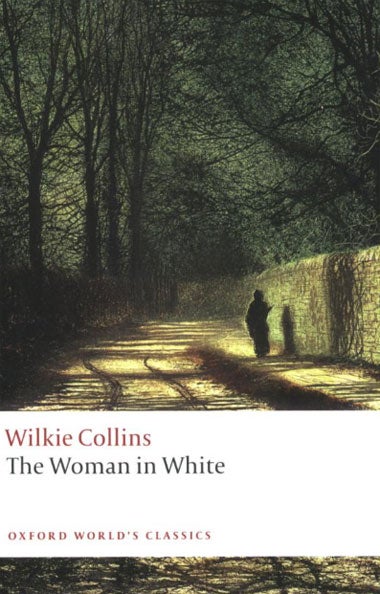Game of Spoilers: How plots have been ruined since Victorian times
Although social media has made them almost impossible to avoid more recently, James Green says spoilers have been an issue for over a century

Your support helps us to tell the story
From reproductive rights to climate change to Big Tech, The Independent is on the ground when the story is developing. Whether it's investigating the financials of Elon Musk's pro-Trump PAC or producing our latest documentary, 'The A Word', which shines a light on the American women fighting for reproductive rights, we know how important it is to parse out the facts from the messaging.
At such a critical moment in US history, we need reporters on the ground. Your donation allows us to keep sending journalists to speak to both sides of the story.
The Independent is trusted by Americans across the entire political spectrum. And unlike many other quality news outlets, we choose not to lock Americans out of our reporting and analysis with paywalls. We believe quality journalism should be available to everyone, paid for by those who can afford it.
Your support makes all the difference.It’s fair to say that with the release of the latest series of HBO’s Game of Thrones and another instalment from Marvel’s Cinematic Universe, Avengers: Endgame, the “spoiler” has never had so much power. Twitter and Facebook have become no-go areas for those yet to watch them, while various guides are offering help on how to live “spoiler-free” online.
In the “real world”, someone’s attempts to leak the conclusion to Endgame outside a Hong Kong cinema reportedly led to them being attacked.
Spoiler culture and “spoiler-phobia” seem like a unique creation of the internet age: a combination of mass audiences, rapid dissemination of information and popular entertainment being released in episodic formats. But these are, in fact, issues that originated with the media of the 19th century.
Our Victorian forebears wouldn’t have called them “spoilers”, but they were often as conscious as we are that the joys of watching or reading fiction can depend on not knowing what’s to come.
The Woman in White
The novelist Wilkie Collins had always been eclipsed by Charles Dickens, his friend and colleague, until The Woman in White began to be published as a serial from November 1859. The novel – an exhilarating mixture of intrigue, madness and crime – was not only “sensational” in terms of its contents, but also in its public reception.
People queued outside the publisher’s offices for the next instalment and placed bets on the “secret” of its antagonist. Meanwhile perfumes and dances were named after it and William Gladstone, then the UK’s chancellor of the exchequer (as we know, he went on to serve four terms as prime minister) cancelled a theatre visit so he could catch up with the newest developments.

Having been released in weekly instalments for more than 10 months, The Woman in White was eventually published in a collected, three-volume format in 1860. To the critics who would soon review the book, Collins cautioned against revealing its plot: “[if] he [the critic] tells it at all, in any way whatever, is he doing a service to the reader, by destroying, beforehand, two main elements in the attraction of all stories – the interest of curiosity, and the excitement of surprise?”
Nowadays, when we’re used to seeing studios and creators go to often extreme lengths to stop audiences and the media revealing details about their work, it’s difficult to appreciate just how curious Collins’s request was – how could a plot-heavy novel be discussed without giving away its contents?
It is comforting to find that modern audiences are far from alone in thinking that the enjoyment of fiction can depend on not knowing everything in advance
Surprisingly, most critics accepted it. The Examiner, a weekly periodical, struggled not to divulge anything, but fully admitted that “giving hints of [the] plot … would impair its interest for readers … yet to make its acquaintance”. Meanwhile, even though another paper, the Saturday Review, disliked the novel, their reviewer thought it would be “unfair to the story” to reveal details. So the critic came to a compromise: “[we hope] there is no objection to an occasional hint, a dark allusion … to this mystery of mysteries, the [plot of] the Woman in White.”
It’s not quite what we’d recognise today as a “spoiler-free” review, but this was new territory for the Victorian reviews and their readers.
The first spoiler?
Other authors followed the example Collins set. Mary Elizabeth Braddon had found huge success with her 1862 novel Lady Audley’s Secret, which revolved around mistaken identities and past crimes. She knew that much of the power of her follow-up novel, Henry Dunbar, could be spoiled if reviewers gave away a “secret” that occurs in the final pages – she therefore asked them “not to describe the plot”.
But critics gave a mixed response this time. Many questioned whether a novel that could be spoiled was worth reading – and whether revealing details in this way really did have a negative effect on the reading experience. The Examiner asked how a novel’s plot is “to be at the same time concealed and criticised?”. In any case, they went on to say, readers could easily guess the secret of Henry Dunbar before it was disclosed – what was the fuss?
The Times went even further: the pleasures of these novels don’t depend on “ignorance” of their endings, the reviewer said, and readers were just as content to see how their plots unfolded.
Nevertheless, Collins and Braddon seem to have won out. An 1871 contributor to the Saturday Review confessed that although they found suspense unpleasant they were not “the majority of novel-readers”, for whom the “anxiety to discover the end” was a valued aspect of fiction. Fifteen years later, we find arguably the first mention of a “spoiler” in print. The Graphic, a weekly illustrated newspaper, began its evaluation of the (deliciously titled) novel Doable Cunning with the following remark:
“We shall avoid spoiling the effect by giving the least hint of its plot, the interest of which depends altogether upon the reader’s coming to it with complete freshness and openness of mind.”
Even if the stakes seem higher today – when billions of dollars are invested in certain entertainment franchises, and series can unfold over many years – it is comforting to find that modern audiences are far from alone in thinking that the enjoyment of fiction can depend on not knowing everything in advance.
James Green is a PhD researcher in English Literature at the University of Exeter. This article first appeared on The Conversation
Join our commenting forum
Join thought-provoking conversations, follow other Independent readers and see their replies
Comments